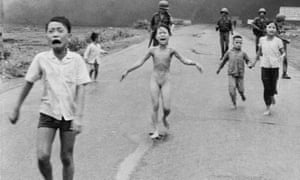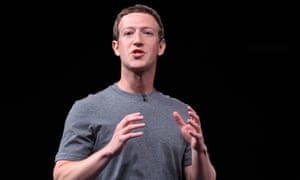Extract from The Guardian
Oh dear. Many will have hoped it would be at least a year between the Facebook board member Peter Thiel covertly closing down an entire media company because he didn’t like it and the firm’s boss, Mark Zuckerberg, actually censoring
the history of the Vietnam war. A year would have been the sort of
seemly distance that might permit us to stop worrying and love our
all-powerful tech overlords again. If, indeed, we ever fell out of love
with them.
After all, plenty of people supported the covert destruction of Gawker by a self-styled libertarian who “no longer believe[s] that freedom and democracy are compatible”, and is seeking to harvest the blood of young people as some kind of transfusable youth elixir (among multiple other batshit quirks you should definitely admire in an absolute power). Like Atlas, plenty of people just shrugged: I mean, really, what’s the worst that could happen next?
Once more unto the valley of the kings, then, as another Silicon monopolist issues a decree, in this case to the indescribably junior entity that is Norway. Around two weeks ago a Norwegian author and journalist reported being banned from Facebook for posting the iconic image of Kim Phuc, in which the naked and badly burnt Vietnamese girl is pictured running screaming from a napalm attack.

After all, plenty of people supported the covert destruction of Gawker by a self-styled libertarian who “no longer believe[s] that freedom and democracy are compatible”, and is seeking to harvest the blood of young people as some kind of transfusable youth elixir (among multiple other batshit quirks you should definitely admire in an absolute power). Like Atlas, plenty of people just shrugged: I mean, really, what’s the worst that could happen next?
Once more unto the valley of the kings, then, as another Silicon monopolist issues a decree, in this case to the indescribably junior entity that is Norway. Around two weeks ago a Norwegian author and journalist reported being banned from Facebook for posting the iconic image of Kim Phuc, in which the naked and badly burnt Vietnamese girl is pictured running screaming from a napalm attack.

If you’re one of those millions of people into whose brain the image has been burnt since the moment they first saw it, you should probably sign the sex offenders register today. The notion that this photo has won the Pulitzer prize and is one of the most famous war images ever shot belongs in the era before Mark Zuckerberg was the world’s most powerful editor. To Facebook, Nick Ut’s photo falls foul of rules designed to screen out pornographic images and those depicting child abuse.
To have censored it once may be regarded as unfortunate; to have censored it countless times begins to look like radioactive creepiness. Yet that is exactly what Facebook has done – a campaign against the censorship of the image saw many Norwegians post it, only to see it removed each time. Furthermore, the social network wrote to the editor of Norway’s largest newspaper, Aftenposten, and demanded the publication remove the image from its Facebook page – then declined to wait for a reply, and stepped in to remove the image itself. After a sustained furore, Facebook has reinstated the picture. So just as Thiel turned out to be a funny sort of libertarian, Zuckerberg is emerging as a funny sort of freedom of expression supporter.

Needless to say, it can do what it pleases. But I’m amazed Facebook can’t see how horrendously weird it makes them look to categorise this important image as some kind of illicit nudie snap. I’m sure that Kim Phuc, as a mother of two Canadian children of the Facebook era, aged 22 and 19, appreciates the platform preserving her … modesty, are we supposed to call it now? Still, it must have been a shock to discover the truth. Imagine surviving napalm burns to a third of your body, when most victims with even 10% perish, and getting all the way to the age of 53 without realising that you’d been involved in a mucky snap all along. Do let’s hope she finds time to thank Facebook for making her feel so special.
I can’t help wondering, meanwhile, if there isn’t a tangential relevance to the fact that the image in contention depicts the horrors of unconventional warfare. Fritz Haber, one of the brilliant leading lights in the early-20th-century development of chemical warfare agents, described them as “a higher form of killing”, a phrase that has been deployed with heavy irony almost ever since. Perhaps the visionary Zuckerberg imagines Facebook to be involved in a higher form of censorship? Haber was one of those deeply worrying scientists able to divorce their work from any potential moral context – the evidence is beginning to suggest Zuckerberg enjoys a similar ability to compartmentalise.
I suspect they all do, this strangely tight social circle of Valley gazillionaires, whose reportedly frequent gatherings I can picture only as an infinitely weirder version of the gentlemen’s club in Trading Places. Of course, like all friends, they fall out and occasionally take that niggle on to social media. Only last week Zuckerberg posted something that indicated he was a little pissed that Elon Musk had broken something of his: “I’m deeply disappointed,” he harrumphed, “to hear that SpaceX’s launch failure destroyed our satellite.” Hey – we’ve all been there. But in the end, blood is thicker than water. I know they’re not related IRL, but perhaps one day soon they will all course with the same harvested blood.
In the meantime, the tech giants remain fortunate enough to operate in the realm of the applauded press conference. Forgive the return to a familiar furrow, but why is it that on the relatively rare occasions these titans concede to interviews, they barely seem to be interrogated, and are spoken to instead in the reverential and admiring tones normally reserved for inventors or eccentric scientists? Just another curiosity to rank alongside a telling New York Times article from a few years ago that profiled the olde worlde Waldorf school in Los Altos that many of the big hitters send their kids to, where screens are absolutely banned . Why? I find it rather difficult to answer that question without recourse to the old cliche of crack dealers avoiding their own product.
It would once have been unthinkable, but the unprecedented power of Facebook is becoming enough to make you yearn for the cuddly analogue media moguls such as Rupert Murdoch. As with the relative simplicities of the cold war, at least you knew where you were with that one.

No comments:
Post a Comment